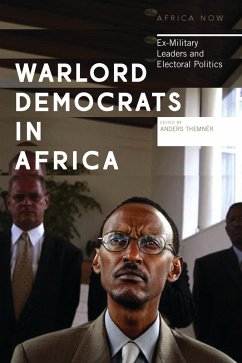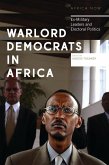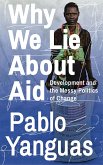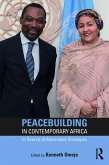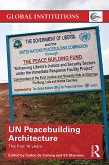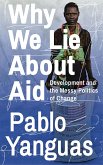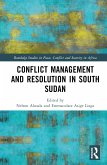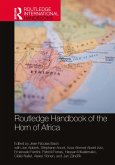Post-war democratization has been identified as a crucial mechanism to build peace in war-ridden societies, supposedly allowing belligerents to compete through ballots rather than bullets. A byproduct of this process, however, is that military leaders often become an integral part of the new democratic system, using resources and networks generated from the previous war to dominate the emerging political landscape.
The crucial and thus-far overlooked question to be addressed, therefore, is what effect the inclusion of ex-militaries into electoral politics has on post-war security. Can 'warlord democrats' make a positive contribution by shepherding their wartime constituencies to support the building of peace and democracy, or are they likely to use their electoral platforms to sponsor political violence and keep war-affected communities mobilized through aggressive discourses?
This important volume, containing a wealth of fresh empirical detail and theoretical insight, and focussing on some of Africa's most high-profile political figures - from Paul Kagame to Riek Machar to Afonso Dhlakama - represents a crucial intervention in the literature of post-war democratization.
The crucial and thus-far overlooked question to be addressed, therefore, is what effect the inclusion of ex-militaries into electoral politics has on post-war security. Can 'warlord democrats' make a positive contribution by shepherding their wartime constituencies to support the building of peace and democracy, or are they likely to use their electoral platforms to sponsor political violence and keep war-affected communities mobilized through aggressive discourses?
This important volume, containing a wealth of fresh empirical detail and theoretical insight, and focussing on some of Africa's most high-profile political figures - from Paul Kagame to Riek Machar to Afonso Dhlakama - represents a crucial intervention in the literature of post-war democratization.
'A much-needed volume taking us beyond the simple solutions so forcefully propagated by the international community in the aftermath of civil wars. Themnér and his contributors take us deep into the political complexities of the African continent.'
Mats Utas, author of African Conflicts and Informal Power
'This collection of excellent articles provides evidence for the wide scope of opportunities and constraints facing former warlords in peacetime. The book implores us to avoid the simplistic labelling of these ambitious political entrepreneurs as men of either war or peace.'
Andreas Mehler, University of Freiburg
'A valuable corrective to broad-brush takes on post-conflict governance on the continent. Through detailed case studies it accomplishes that most rare feat: thinking African politics on its own terms.'
Danny Hoffman, University of Washington
'This wonderful volume brings together a superb team of specialists to investigate the concept of "warlord democrats." This book will be of great value to those seeking to understand the complex transformations that characterize ending violence and building post-war political orders.'
Terrence Lyons, George Mason University
'A major work. This book tells us exactly how and why wartime leaders play significant roles in post-war politics. Extremely insightful and clear, it is likely to spur a new research programme in the study of post-conflict politics and state-building. It should be widely read.'
William Reno, Northwestern University
'An excellent collection of essays. The political economy analysis it offers should be of particular interest to those - quite especially the UN and those charged with running its peace operations - trying to build peace and secure durable political settlements to long-running conflicts.'
Mats Berdal, King's College London
'I would recommend this book to scholars and general readers interested in studying the dynamics of the state, institutions, and political leadership in post-Cold War Africa.'
Paul Chiudza Banda, African Studies Quarterly
'Themnér's editorial prowess in securing such diverse, thoughtful contributions is evident ... essential reading for any individual interested in postconflict stabilization and the reintegration of former state adversaries within state governing structures.'
Parameters
Mats Utas, author of African Conflicts and Informal Power
'This collection of excellent articles provides evidence for the wide scope of opportunities and constraints facing former warlords in peacetime. The book implores us to avoid the simplistic labelling of these ambitious political entrepreneurs as men of either war or peace.'
Andreas Mehler, University of Freiburg
'A valuable corrective to broad-brush takes on post-conflict governance on the continent. Through detailed case studies it accomplishes that most rare feat: thinking African politics on its own terms.'
Danny Hoffman, University of Washington
'This wonderful volume brings together a superb team of specialists to investigate the concept of "warlord democrats." This book will be of great value to those seeking to understand the complex transformations that characterize ending violence and building post-war political orders.'
Terrence Lyons, George Mason University
'A major work. This book tells us exactly how and why wartime leaders play significant roles in post-war politics. Extremely insightful and clear, it is likely to spur a new research programme in the study of post-conflict politics and state-building. It should be widely read.'
William Reno, Northwestern University
'An excellent collection of essays. The political economy analysis it offers should be of particular interest to those - quite especially the UN and those charged with running its peace operations - trying to build peace and secure durable political settlements to long-running conflicts.'
Mats Berdal, King's College London
'I would recommend this book to scholars and general readers interested in studying the dynamics of the state, institutions, and political leadership in post-Cold War Africa.'
Paul Chiudza Banda, African Studies Quarterly
'Themnér's editorial prowess in securing such diverse, thoughtful contributions is evident ... essential reading for any individual interested in postconflict stabilization and the reintegration of former state adversaries within state governing structures.'
Parameters

